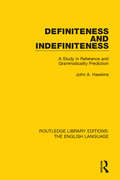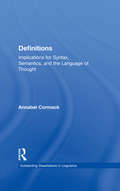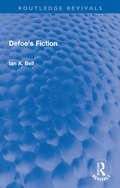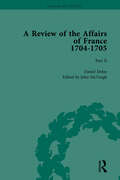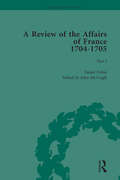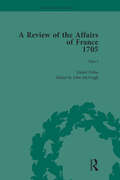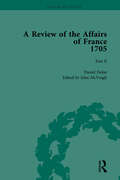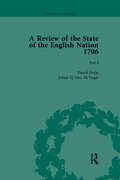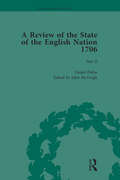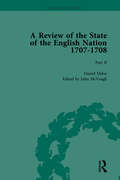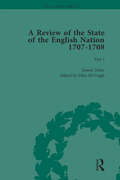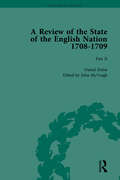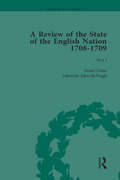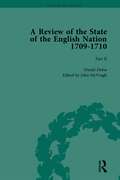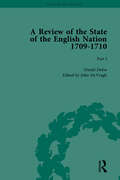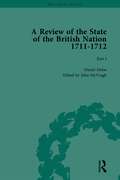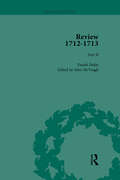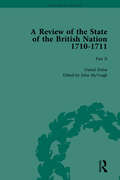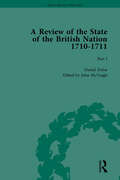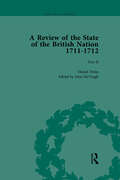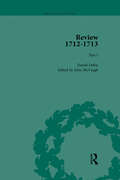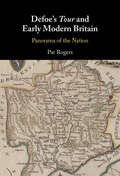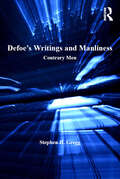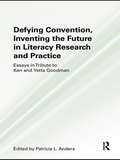- Table View
- List View
Definiteness and Indefiniteness: A Study in Reference and Grammaticality Prediction (Routledge Library Editions: The English Language #11)
by John A. HawkinsFirst published in 1988, this book is concerned with the definite and indefinite articles in English. It provides an integrated pragmatic-semantic theory of definite and indefinite reference, on the basis of which, many co-occurance restrictions between articles and non-modifiers are explained. At the general theoretical level, this book looks at the role of semantics in the prediction of all and only the grammatical sentences of a language. A generalisation is proposed uniting semantic oppositions underlying ungrammaticality with syntactic oppositions between conditions of application on transformational generative rules. A procedure is suggested for distinguishing semantic from syntactic causes of ungrammaticality. At a more particular level, the book explores the nature of reference. It examines an important selection of subjects such as the contrast between definiteness and indefiniteness, the relationship between definite and demonstrative reference, and the relationship between pragmatic and logical aspects of determining meaning.
Definitions: Implications for Syntax, Semantics, and the Language of Thought (Outstanding Dissertations in Linguistics)
by Annabel CormackThe answer to the question "How can we understand and use a definition?" provides new constraints on natural language and on the internal language in which meaning is mentally represented. Most syntax takes the sentence as the basic unit for well-formedness, but definitions force us to focus on words and phrases, and hence to focus on compositional syntax in parallel with compositional semantics. This study examines both dictionary definitions and definitions from textbooks, from the points of view of their syntax, semantics, and use for learning word meaning. The tools used throughout are Principles and Parameters syntax, Relevance theoretic pragmatics, Model theoretic semantics, and the formal theory of definitions. The analyses argue that because phrases can be understood in isolation, some standard syntactic analyses must be modified. 'NP movement' has to be reanalysed as transmission of theta roles. These ideas are then applied to a variety of adjectives which take propositional complements. The final chapter argues that for definitions to be understood, the syntax of the Language of Thought must be close to that of Natural Language in specifiable way.
Defoe's America
by Dennis ToddThe Americas appear as an evocative setting in more than half of Daniel Defoe's novels, and often offer a new beginning for his characters. In the first full-length study of Defoe and colonialism, Dennis Todd explores why the New World loomed so large in Defoe's imagination. By focusing on the historical contexts that informed Defoe's depiction of American Indians, African slaves, and white indentured servants, Dennis Todd investigates the colonial assumptions that shaped his novels and, at the same time, uncovers how Defoe used details of the American experience in complex, often figurative ways to explore the psychological bases of the profound conversions and transformations that his heroes and heroines undergo. And by examining what Defoe knew and did not know about America, what he falsely believed and what he knowingly falsified, Defoe's America probes the doubts, hesitancies, and contradictions he had about the colonial project he so fervently promoted.
Defoe's Fiction (Routledge Revivals)
by Ian A. BellFirst published in 1985, Defoe’s Fiction explores Defoe’s work by considering it in the context of its genre. The book highlights the difficulty of placing Defoe’s fiction in the most appropriate context due to it being aimed primarily at a popular market, in contrast to the more literary productions of Pope, Swift, or Addison. It also comments on the trend of focusing on Defoe’s irony or emphasising his mimetic power. In doing so, it seeks to explain, rather than judge, Defoe’s achievement by looking at his whole body of work in the context of its genre. Defoe’s Fiction will appeal to those with an interest in Defoe, comparative literature, and the history of literary criticism.
Defoe's Review 1704-13, Volume 1 (Defoe's Review 1704–13)
by John McVeaghOne of Daniel Defoe's greatest achievements was the writing and publication of his "Review". Covering his many interests, both contemporary and historical, Defoe published his journal twice and latterly three times a week. This volume reproduces the "Review" from the year 1704.
Defoe's Review 1704-13, Volume 1 (Defoe's Review 1704–13)
by John McVeaghOne of Daniel Defoe's greatest achievements was the writing and publication of his "Review". Covering his many interests, both contemporary and historical, Defoe published his journal twice and latterly three times a week. This volume reproduces the "Review" from the year 1704.
Defoe's Review 1704-13, Volume 2 (Defoe's Review 1704–13)
by John McVeaghThis volume is an important and rare work in the political and literary history of England and for a Defoe scholar. It is one of the earliest examples of the political periodical, and includes discussions on the parliamentary election of 1705 and Defoe's weekly Scandal Club correspondence.
Defoe's Review 1704-13, Volume 2 (Defoe's Review 1704–13)
by John McVeaghDefoe's Review is one of the earliest examples of the political periodical which became popular in the 18th century, publishing a regular political essay and discussion on current affairs. This volume on France runs from February to December 1705 in 127 parts.
Defoe's Review 1704-13, Volume 3 (Defoe's Review 1704–13)
by John McVeaghOne of Daniel Defoe's greatest achievements was the writing and publication of his "Review". Covering his many interests, both contemporary and historical, Defoe published his journal twice and latterly three times a week. This volume reproduces the "Review" from the year 1704.
Defoe's Review 1704-13, Volume 3 (Defoe's Review 1704–13)
by John McVeaghOne of Daniel Defoe's greatest achievements was the writing and publication of his "Review". Covering his many interests, both contemporary and historical, Defoe published his journal twice and latterly three times a week. This volume reproduces the "Review" from the year 1704.
Defoe's Review 1704-13, Volume 4 (Defoe's Review 1704–13)
by John McVeaghCovering Daniel Defoe's many interests, both literary and historical, this edition is the fourth volume in "Pickering and Chatto's" 18-volume series.
Defoe's Review 1704-13, Volume 4 (Defoe's Review 1704–13)
by John McVeaghCovering Daniel Defoe's many interests, both literary and historical, this edition is the fourth volume in "Pickering and Chatto's" 18-volume series.
Defoe's Review 1704-13, Volume 5 (Defoe's Review 1704–13)
by John McVeaghDiscusses one of Daniel Defoe's greatest, but least known works, his periodical the "Review of the State of the British Nation". Defoe's Review played a significant role in the birth of the modern press. It was not a newspaper dealing in facts but a journal of opinion and discussion.
Defoe's Review 1704-13, Volume 5 (Defoe's Review 1704–13)
by John McVeaghDiscusses one of Daniel Defoe's greatest, but least known works, his periodical the "Review of the State of the British Nation". Defoe's Review played a significant role in the birth of the modern press. It was not a newspaper dealing in facts but a journal of opinion and discussion.
Defoe's Review 1704-13, Volume 6 (Defoe's Review 1704–13)
by John McVeagh"Defoe's Review" tapped into a new cultural community, helping to create the climate for Steele and Addison to develop the "Tatler" and "Spectator" in later years. This volume is suitable for scholars researching the history and literature of the eighteenth century, as well as the history of print and the book.
Defoe's Review 1704-13, Volume 6 (Defoe's Review 1704–13)
by John McVeagh"Defoe's Review" tapped into a new cultural community, helping to create the climate for Steele and Addison to develop the "Tatler" and "Spectator" in later years. This volume is suitable for scholars researching the history and literature of the eighteenth century, as well as the history of print and the book.
Defoe's Review 1704-13, Volume 8 (Defoe's Review 1704–13)
by John McVeaghDefoe's Review played a significant role in the birth of the modern press. It was not a newspaper dealing in facts but a journal of opinion and discussion. This series is the first complete scholarly edition of the entire run of Defoe's Review. It is fully reset and supported by full editorial apparatus.
Defoe's Review 1704–13, Volume 9 (Defoe's Review 1704–13)
by John McVeaghDefoe's Review played a significant role in the birth of the modern press. It was not a newspaper dealing in facts but a journal of opinion and discussion. This series is the first complete scholarly edition of the entire run of Defoe's Review. It is fully reset and supported by full editorial apparatus.
Defoe's Review 1704�13, Volume 7 (Defoe's Review 1704–13)
by John McVeaghDefoe's Review played a significant role in the birth of the modern press. It was not a newspaper dealing in facts but a journal of opinion and discussion. This series is the first complete scholarly edition of the entire run of Defoe's Review. It is fully reset and supported by full editorial apparatus.
Defoe's Review 1704�13, Volume 7 (Defoe's Review 1704–13)
by John McVeaghDefoe's Review played a significant role in the birth of the modern press. It was not a newspaper dealing in facts but a journal of opinion and discussion. This series is the first complete scholarly edition of the entire run of Defoe's Review. It is fully reset and supported by full editorial apparatus.
Defoe's Review 1704�13, Volume 8 (Defoe's Review 1704–13)
by John McVeaghDefoe's Review played a significant role in the birth of the modern press. It was not a newspaper dealing in facts but a journal of opinion and discussion. This series is the first complete scholarly edition of the entire run of Defoe's Review. It is fully reset and supported by full editorial apparatus.
Defoe's Review 1704�13, Volume 9 (Defoe's Review 1704–13)
by John McVeaghDefoe's Review played a significant role in the birth of the modern press. It was not a newspaper dealing in facts but a journal of opinion and discussion. This series is the first complete scholarly edition of the entire run of Defoe's Review. It is fully reset and supported by full editorial apparatus.
Defoe's Tour and Early Modern Britain: Panorama of the Nation
by Pat RogersAuthoritative yet accessible, this is the first-ever comprehensive account of a true landmark in eighteenth-century travel writing. Daniel Defoe's Tour thro' the Whole Island of Great Britain is constantly cited even now by students in practically every branch of history, and there are few topics essential to our understanding of the nation in the early modern period that do not show up in its pages. Historians since the late nineteenth century have looked to the Tour as one of the richest and most insightful works describing Britain in the lead-up to the Industrial Revolution, and critics and biographers of Defoe have regularly named it as among his most characteristic and central works. Indispensable for virtually any interdisciplinary approach to the nation in this period, this new study provides wide-reaching, up-to-date analysis of the content of the Tour, and of its methods, sources, form, and vast historical significance.
Defoe’s Writings and Manliness: Contrary Men
by Stephen H. GreggDefoe's Writings and Manliness is a timely intervention in Defoe studies and in the study of masculinity in eighteenth-century literature more generally. Arguing that Defoe's writings insistently returned to the issues of manliness and its contrary, effeminacy, this book reveals how he drew upon a complex and diverse range of discourses through which masculinity was discussed in the period. It is for this reason that this book crosses over and moves between modern paradigms for the analysis of eighteenth-century masculinity to assess Defoe's men. A combination of Defoe's clarity of vision, a spirit of contrariness and a streak of moral didacticism resulted in an idiosyncratic and restless testing of the forces surrounding his period's ideas of manliness. Defoe's men are men, but they are never unproblematically so: they display a contrariness which indicates that a failure of manliness is never very far away.
Defying Convention, Inventing the Future in Literary Research and Practice
by Patricia L. AndersKen and Yetta Goodman are renowned and revered worldwide for their pioneering, influential work in the field of reading/literacy education. In this volume major literacy scholars from around the world pay tribute to their work and offer glimpses of what the future of literacy research and practice might be. The book is structured around several themes related to research, practice, and theories of reading and literacy processes that characterize the Goodmans’ scholarship. Each chapter reveals how the author’s scholarship connects to one or both of the Goodmans’ work and projects that connection to the future – what are the implications for future research, theory, practice, and/or assessment? This milestone volume marking the hugely significant work of the Goodmans will be welcomed across the field of literacy education.
